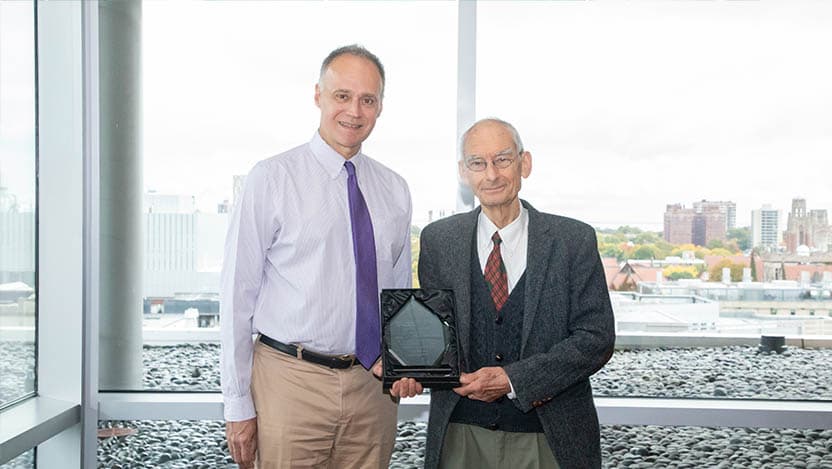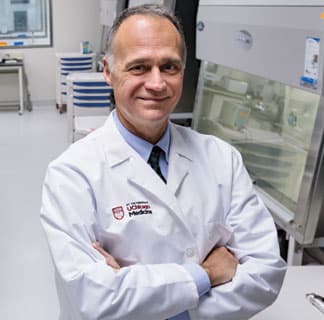Hans Schreiber receives inaugural Jonas Memorial Award for contributions to cellular immunotherapy

Hans Schreiber, MD, PhD, Professor of Pathology at the University of Chicago Medicine Comprehensive Cancer Center, received the David Jonas Memorial Award in recognition for his dedication and significant contributions to the field of cellular immunotherapy.
He was presented with the inaugural award on Sept. 16 at the 2022 Jonas Center Cellular Therapy Symposium, held at the David Rubenstein Forum in Chicago and virtually.
“The ultimate goal is to bring together the best and brightest leaders in cellular therapy to collaborate, educate, and inspire research that ultimately leads to lifesaving therapies for cancer and other serious illnesses," said Peter Riedell, MD, Assistant Professor of Medicine who was the course director for the symposium.
Cellular therapy — a type of immunotherapy that transfers human cells to heal or replace damaged tissue or cells — holds much promise for patients with cancer and other diseases. UChicago Medicine physicians are pioneers in cellular therapy care, including stem cell transplantation and CAR T-cell therapy. Jonas Center research is transforming the way we treat cancer, bringing science closer to finding a cure.
Schreiber’s research focus is on T-cell therapy using T cell receptors (TCRs). Most molecular targets that are truly cancer-specific result from mutations in cancer cells and are most effectively recognized by TCRs. Most of these mutations are individually distinct for each cancer and specific for each patient. Schreiber’s research is developing therapy using TCRs that recognize these patient-specific antigens. This TCR therapy can be very effective and is truly cancer-specific because mutations are restricted to the cancer cells.
The inaugural award was established in 2021 in memory of the late David Jonas, a businessman and donor to the University of Chicago for cellular therapy research.
“I admire Mr. David Jonas’ incredibly deep vision to support the development of a truly personalized cancer therapy that can be highly effective although difficult to commercialize," Schreiber said about receiving the award.
Overcoming treatment challenges
T cells patrol our bodies, searching for signs of infection and disease. When T cells detect an abnormal protein – called an antigen – on the surface of a cell, they latch onto it with a matching receptor. Like puzzle pieces, the antigen and T-cell receptor bind together, triggering an immune response that destroys the cell.Some cancers, however, develop ways to trick the immune system, such as by disguising themselves as healthy cells or by shutting down the immune response altogether. CAR T-cell therapy helps to resolve this by modifying patients’ T cells in the lab, so they can better recognize and target cancer-specific antigens.
There isn’t a “one-size-fits-all” approach to targeting antigens since they are unique to each patient and his or her tumor; nor is there a reliable method for predicting which antigens a given tumor will express.
Schreiber developed a new method for personalized T-cell therapy. By characterizing a patient’s T-cell receptors, he can engineer a customized therapy that accurately targets the tumor’s unique antigens.
This highly personalized approach to T-cell therapy can safely target cancer cells, without damaging healthy tissue. It also has the potential to treat other cancer types —beyond blood cancers —including hard-to-treat solid tumors like pancreatic and ovarian cancers.
“Dr. Schreiber has made several seminal contributions to the field of cancer immunology in general and cellular immunotherapy in specific,” said Michael R. Bishop, MD, Professor of Medicine and Director of the David and Etta Jonas Center for Cellular Therapy at UChicago Medicine. “His continued research now is focused on expanding the breadth of cellular therapy so that it can be applied beyond blood cancers to solid tumors.”
Schreiber earned a medical degree from the University of Freiburg in Germany in 1969, a PhD from the University of Chicago in 1977 and completed his residency at the University of Chicago Pritzker School of Medicine.
The Jonas Center
In 2020, a $10 million gift from David Jonas gave researchers at the UChicago Medicine the ability to accelerate the development of personalized therapies for hard-to-treat cancers and extend them to more patients.The David and Etta Jonas Center for Cellular Therapy at UChicago Medicine unites a team of experts dedicated to improving cellular therapy, especially T-cell treatments like CAR (chimeric antigen receptor) T-cell therapy, an emerging form of cancer treatment. CAR T-cell therapy works by supercharging patients’ white blood cells to seek out and destroy cancer cells.
Although this therapy has, in some cases, led to complete remission, it is not always successful and is currently limited to treating certain blood cancers.
Through the David and Etta Jonas Center for Cellular Therapy, researchers at UChicago Medicine will work to overcome these challenges and realize the full potential of cellular therapy. This includes efforts to improve the therapy’s overall effectiveness and extend its benefits to a much broader group of patients, including those with difficult-to-treat cancers such as pancreatic and ovarian cancer.
The Jonas family’s gift provides essential funding to advance research initiatives, while also putting in place the infrastructure to sustain a successful research enterprise in the years to come.
A longtime healthcare executive, Jonas was impressed by UChicago Medicine’s multidisciplinary research program and commitment to attaining tangible outcomes that can help patients. He identified that UChicago Medicine has all the key elements for a successful research program: experience in clinical trials, access to leading-edge technology, a history of attracting scientific talent, and a strong team to lead the program. David Jonas died in 2021.
“I had the pleasure of meeting David Jonas in 2019,” Bishop said. “I immediately saw that David was the type of man who had a deep passion for science and medicine. Quiet by nature, but deeply caring and introspective, he was equally passionate about his philanthropic initiatives as he was his business affairs.”
Bishop said David Jonas is sorely missed, but his legacy lives on through the David and Etta Jonas Center for Cellular Therapy and all that will be accomplished with his partnership.

Leaders in Cellular Therapy Care & Research
Cellular therapy — the transfer of human cells to heal or replace damaged tissue or cells — holds much promise for patients with cancer and other diseases. UChicago Medicine physicians are pioneers in cellular therapy care, including CAR T-cell therapy, stem cell transplantation and TIL therapy.
Learn more about cellular therapy at UChicago Medicine